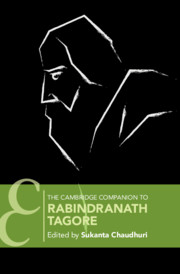Book contents
- Frontmatter
- Contents
- List of Illustrations
- Notes on Contributors
- Preface
- Note on Conventions and Practices
- 1 Rabindranath Tagore: From Art to Life
- 2 A Garland of Many Tagores
- Part I Overviews
- Part II Studies
- 12 Women, Gender, and the Family in Tagore
- 13 On the Seashore of Endless Worlds: Rabindranath and the Child
- 14 Tagore's View of History
- 15 Tagore's View of Politics and the Contemporary World
- 16 Tagore's Santiniketan: Learning Associated with Life
- 17 Tagore and Village Economy: A Vision of Wholeness
- 18 An Ecology of the Spirit: Rabindranath's Experience of Nature
- 19 Rabindranath and Science
- 20 Rabindranath Tagore as Literary Critic
- 21 Tagore's Aesthetics
- 22 Rabindranath, Bhakti, and the Bhakti Poets
- 23 Tagore and the Idea of Emancipation
- 24 Tagore's Thoughts on Religion
- 25 Rabindranath Tagore and Humanism
- List of Tagore's Works Cited, with Index
- Further Reading
- General Index
23 - Tagore and the Idea of Emancipation
from Part II - Studies
Published online by Cambridge University Press: 24 December 2019
- Frontmatter
- Contents
- List of Illustrations
- Notes on Contributors
- Preface
- Note on Conventions and Practices
- 1 Rabindranath Tagore: From Art to Life
- 2 A Garland of Many Tagores
- Part I Overviews
- Part II Studies
- 12 Women, Gender, and the Family in Tagore
- 13 On the Seashore of Endless Worlds: Rabindranath and the Child
- 14 Tagore's View of History
- 15 Tagore's View of Politics and the Contemporary World
- 16 Tagore's Santiniketan: Learning Associated with Life
- 17 Tagore and Village Economy: A Vision of Wholeness
- 18 An Ecology of the Spirit: Rabindranath's Experience of Nature
- 19 Rabindranath and Science
- 20 Rabindranath Tagore as Literary Critic
- 21 Tagore's Aesthetics
- 22 Rabindranath, Bhakti, and the Bhakti Poets
- 23 Tagore and the Idea of Emancipation
- 24 Tagore's Thoughts on Religion
- 25 Rabindranath Tagore and Humanism
- List of Tagore's Works Cited, with Index
- Further Reading
- General Index
Summary
This essay is an attempt to understand Tagore's idea of emancipation, locating it against the trajectory of Indian philosophy. In both classical India and ancient Greece, philosophy had a distinctly practical motive. Although many issues come up for scrutiny in the Socratic dialogues, for example, one particular question has an overriding presence: the nature of the good life, and the superiority of a good life over other types of life. The classical Indian philosopher, in his turn, is preoccupied with the search for an ideal life that is not fraught with the vagaries of mundane existence. The ideal life is to be reached by breaking all shackles of material bondage and freeing oneself from suffering of all kinds (twenty-one kinds, for instance, in the Nyāya school of philosophy). Indian philosophy is thus moulded from the beginning by the search for an ideal life.
This practical motive has left a distinct mark on Indian philosophical speculation. Classical Indian philosophical theories never lost their touch with this ultimate goal of human life. This perhaps explains why Indian philosophy never had any concern with formal logic in the way Western philosophy has. The age-old debate in Western philosophical tradition between experience and reason as sources of knowledge is conspicuous by its absence in Indian philosophy. This can be explained by the Indian philosopher's attempt to treat epistemology as a branch of the psychology of knowledge. In India, we therefore have the kind of metaphysical speculation that is ‘almost a matter-of-fact study of reality’, where it is argued that reals are either perceived or inferred from perceptual data or known through some other accredited sources of knowledge. There are held to be reliable sources of apprehension even in matters of faith. And where normal inferential methods are not applicable, we can try to grasp the truths intuitively through some esoteric exercises.
This also explains why poetry and philosophy are never at war with each other, unlike in the West: a point forcefully made by Tagore in his presidential address to the first Indian Philosophical Congress in December 1925. From this perspective, Tagore can be placed very much in the tradition of Indian philosophical inquiry. In his philosophical essays, Tagore explores some of the fundamental metaphysical issues of Indian philosophy.
- Type
- Chapter
- Information
- The Cambridge Companion to Rabindranath Tagore , pp. 391 - 402Publisher: Cambridge University PressPrint publication year: 2020



